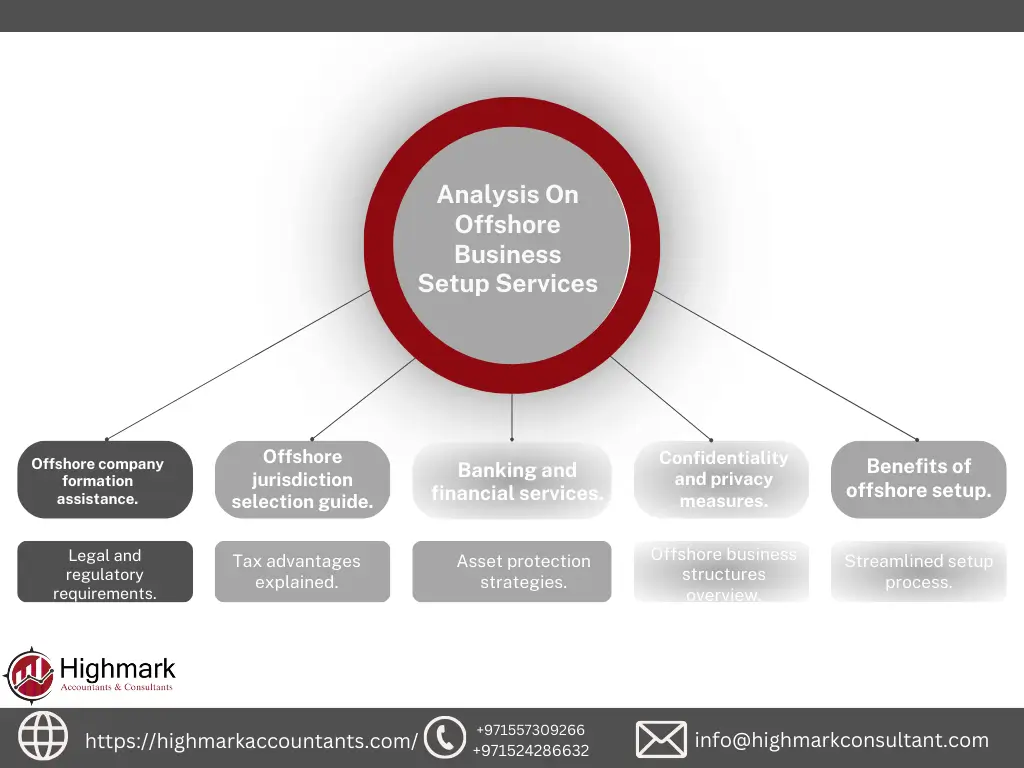Common Questions About Offshore Company Formations Answered by Experts
Wiki Article
Demystifying Offshore Firm Formations: How They Operate and What to Anticipate
Offshore firm formations can seem complicated and enigmatic. Offshore Company Formations. These entities, frequently developed for tax obligation advantages and privacy, operate under one-of-a-kind lawful frameworks. Entrepreneurs might find themselves steering through a labyrinth of laws and compliance requirements. Recognizing the complexities is vital for success. What are the actual benefits? What are the possible risks? A closer evaluation exposes the subtleties that might affect decision-making substantiallyRecognizing Offshore Companies: Types and definitions
Offshore companies are entities established in a jurisdiction outside of an individual's or business's primary country of house, frequently for functions associated to tax optimization, possession protection, or regulatory advantages. These companies can take numerous kinds, consisting of restricted obligation business (LLCs), international company companies (IBCs), and offshore trusts. Each type offers details features and allures to various requirements.Restricted obligation companies supply proprietors with defense from personal liability, while worldwide company companies are prominent for their versatility and minimal coverage demands. Offshore counts on, on the various other hand, are used mainly for estate preparation and possession protection.
The selection of jurisdiction significantly affects the business's operations, as some areas provide more desirable legal structures and privacy defenses. Offshore Company Formations. Comprehending the differences in between these kinds is crucial for organizations and people considering overseas structures, as each choice brings different implications for administration and compliance
The Benefits of Developing an Offshore Company
Developing an offshore business can give many benefits, specifically for those seeking to improve their financial methods and safeguard their properties. One significant benefit is tax obligation optimization; several jurisdictions use beneficial tax obligation prices or exceptions, enabling businesses to keep even more earnings. Additionally, overseas business can supply a layer of personal privacy, shielding the identities of proprietors and investors from public scrutiny.Another advantage is possession security. By positioning assets in an offshore entity, individuals can protect their wealth from possible legal claims or political instability in their home countries. This structure also facilitates international company operations, allowing much easier accessibility to worldwide markets and varied clients.
The establishment of an overseas firm can boost trustworthiness and eminence, appealing to customers that value worldwide organization practices. On the whole, these benefits make offshore business formations an eye-catching alternative for services and individuals going for monetary growth and protection.
Secret Considerations Prior To Developing an Offshore Entity
Prior to developing an offshore entity, a number of vital factors have to be analyzed. Legal conformity demands, tax obligation ramifications and advantages, in addition to jurisdiction choice, play a significant function in the decision-making process. Recognizing these considerations can aid businesses and people browse the complexities of overseas company formations successfully.
Lawful Compliance Demands
When considering the development of an offshore entity, comprehending lawful compliance needs is necessary to guarantee adherence to both neighborhood and international legislations. Prospective entrepreneur should acquaint themselves with policies controling firm registration, reporting obligations, and functional standards in the picked jurisdiction. This consists of verifying the legal needs for directors and investors, along with guaranteeing compliance with anti-money laundering (AML) and know-your-customer (KYC) laws. Additionally, organizations should stay conscious of any kind of licensing requirements specific to their market. Engaging regional lawful and economic specialists can provide important insights, guaranteeing that all needed documents is prepared and sent appropriately. Inevitably, extensive understanding of legal compliance assists reduce dangers and promotes a sustainable offshore operation.Tax Implications and Benefits
Numerous business owners consider the tax implications and advantages of creating an overseas entity as a vital consider their decision-making procedure. Offshore business can provide significant tax obligation benefits, such as minimized corporate tax prices, exemption from certain local tax obligations, and the capability to defer tax obligations on international earnings. These benefits can lead to boosted productivity and capital, making overseas structures appealing for global service operations. In addition, the possibility for tax treaties might additionally reduce tax obligation responsibilities. Nevertheless, it is essential for company owner to recognize the complexities involved, consisting of compliance with both global and regional tax guidelines. Engaging with tax obligation professionals is suggested to navigate these ins and outs effectively and guarantee ideal tax preparation strategies.Jurisdiction Choice Variables
What elements should one think about when picking a jurisdiction for offshore business development? Key considerations consist of tax obligation performance, regulatory setting, and political security. Jurisdictions with favorable tax routines can significantly affect productivity. The governing landscape ought to offer versatility and simplicity of conformity, permitting for reliable business operations. Political security is vital, as it guarantees the safety of assets and continuity of operations. Additionally, the credibility of the jurisdiction can affect client trust and business relationships. Accessibility to banking services and the availability of specialist assistance solutions are additionally important. Comprehending local regulations pertaining to privacy, coverage, and ownership requirements is vital to ascertain that the overseas entity aligns with the business owner's objectives and lawful obligations. Possession The Process of Establishing Up an Offshore Company Establishing an offshore business entails a series of critical steps that need careful preparation and conformity with worldwide laws. At first, a specific need to select an appropriate jurisdiction that lines up with their business goals and supplies beneficial tax obligation benefits. Complying with territory selection, the next action is to pick an one-of-a-kind business name and prepare the necessary paperwork, consisting of short articles of unification and shareholder arrangements.Once the documentation prepares, it must be submitted to the pertinent authorities along with the needed fees. After approval, the business will certainly obtain a certification of incorporation, officially establishing its legal presence. The specific must then open a corporate checking account to assist in economic purchases.
Finally, maintaining an offshore company includes adhering to continuous compliance demands, such as yearly reporting and tax obligations, which vary by jurisdiction. Comprehending each step is crucial for an effective offshore firm formation.

Lawful and Regulative Structure for Offshore Business
While establishing an offshore firm can use significant advantages, it is important to steer with the intricate legal and governing framework that controls such entities. weblink Each jurisdiction has its own collection of legislations that dictate whatever from firm formation to taxation and conformity demands. These policies are made to stop illegal activities, such as cash laundering and tax evasion, and often call for comprehensive documents and transparency.Crucial element of this structure consist of the necessity of selecting neighborhood supervisors, maintaining an authorized office, and sticking to yearly coverage commitments. In addition, many jurisdictions impose particular licensing demands for specific organization tasks. Recognizing these lawful specifications is crucial for making certain compliance and mitigating threats associated with penalties or legal conflicts. As a result, engaging with attorneys that concentrate on offshore business can assist in maneuvering via this intricate landscape, eventually facilitating a compliant and effective offshore business procedure.
Typical False Impressions Concerning Offshore Business
Many individuals hold mistaken beliefs about overseas business, typically equating them with tax obligation evasion and illegal activities. It is important to identify that these entities can operate legitimately within a framework created for genuine organization methods. Making clear the legal standing of overseas business can aid dispel these misconceptions and advertise a more precise understanding of their function.Tax Evasion Myths
Regardless of the growing popularity of overseas companies, mistaken beliefs about their use for tax obligation evasion linger. Many people incorrectly believe that establishing an overseas entity is only a means to prevent tax obligations. Offshore business are usually utilized for genuine functions, such as property defense, worldwide service growth, and financial investment diversity. The understanding that all overseas tasks correspond to illegal tax evasion ignores the complexities of worldwide tax policies and compliance requirements. Additionally, the vast majority of offshore territories have actually executed steps to fight tax evasion, promoting transparency and details exchange. This mischaracterization can deter legit businesses and investors from exploring the potential benefits of offshore company formations while perpetuating a negative stigma surrounding these entities.Lawful Standing Clarified
The legal condition of overseas business is usually misconstrued, bring about a range of misconceptions. Many believe these entities operate in a legal gray location, thinking they are dishonest or inherently unlawful. In truth, overseas firms are genuine companies created under the legislations of details jurisdictions, made for different factors, including property protection and market growth. Another typical misunderstanding is that overseas companies escape taxes completely; nonetheless, they are subject to the laws and tax responsibilities of their home nations. Additionally, some individuals think that overseas companies can be quickly manipulated for money laundering or unlawful tasks. While abuse can occur, a lot of territories enforce stringent conformity and transparency legislations to alleviate such risks, guaranteeing that overseas firms operate within legal frameworks.
Handling and Running Your Offshore Company Successfully
Effectively managing and operating an overseas firm requires a tactical technique that stabilizes conformity with local guidelines and the search of organization goals. Successful offshore administration includes recognizing the territory's tax obligation laws, reporting requirements, and operational policies. Utilizing regional professionals, such as accounting professionals and lawful experts, can provide indispensable understandings right into going across these intricacies.In addition, establishing clear communication channels and operational protocols is important for keeping efficiency. Utilizing innovation for task management and cooperation can enhance productivity, while routine efficiency reviews assurance positioning with strategic goals.
Keeping robust economic documents is crucial, as openness fosters depend on with stakeholders and complies with global criteria. Being versatile to adjustments in regulation More Help or market conditions allows overseas firms to pivot properly, guaranteeing lasting sustainability and growth. By adhering to these concepts, company owner can make the most of the advantages of their offshore endeavors while mitigating threats.
Often Asked Inquiries
How Much Does It Price to Maintain an Offshore Business Yearly?
The expense to keep an overseas company every year differs significantly, generally varying from $1,000 to $5,000, relying on jurisdiction, services needed, and conformity commitments. It is vital to take into consideration additional fees for particular demands.Can I Open Up a Checking Account for My Offshore Business From Another Location?
Opening up a savings account for an offshore business from another location is typically feasible. However, demands might vary by territory, frequently demanding documentation and verification processes, which can complicate the remote application experience for people.Exist Specific Countries Understood for Easier Offshore Business Formations?
Specific countries, such as Belize, Seychelles, and the British Virgin Islands, are renowned for their streamlined procedures and positive laws relating to overseas business developments, drawing in business owners seeking efficiency and confidentiality in company operations.
What Types of Organizations Are Ideal Matched for Offshore Business?
Certain organizations, such as investment, consultancy, and ecommerce companies, typically take advantage of offshore companies because of tax obligation benefits, personal privacy, and regulatory versatility - Offshore Company Formations. These entities typically flourish in useful link territories that advertise desirable company atmospheresJust How Can I Guarantee Conformity With Neighborhood Laws When Operating Offshore?
To ensure conformity with neighborhood laws when operating offshore, it is vital to involve lawful professionals, carry out detailed study on territory laws, and keep clear economic documents, therefore decreasing threats linked with non-compliance.
Report this wiki page